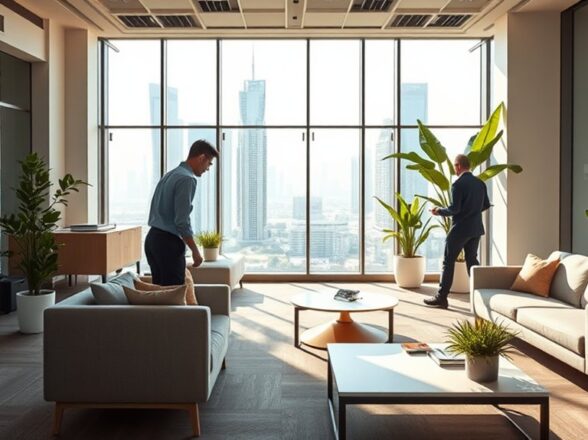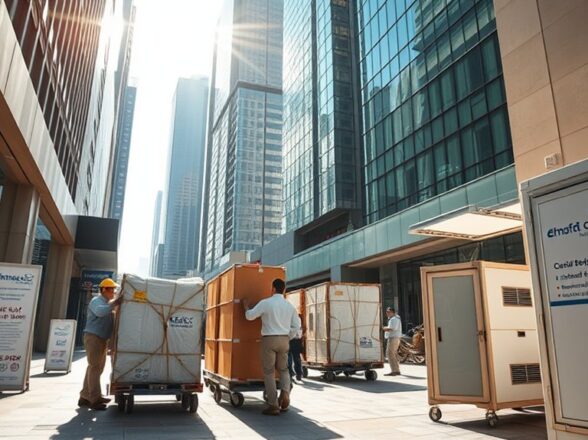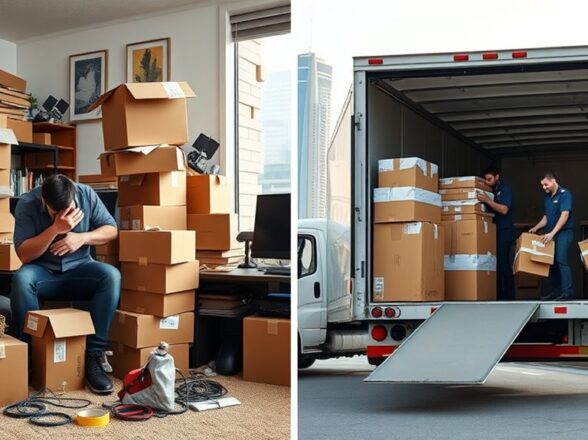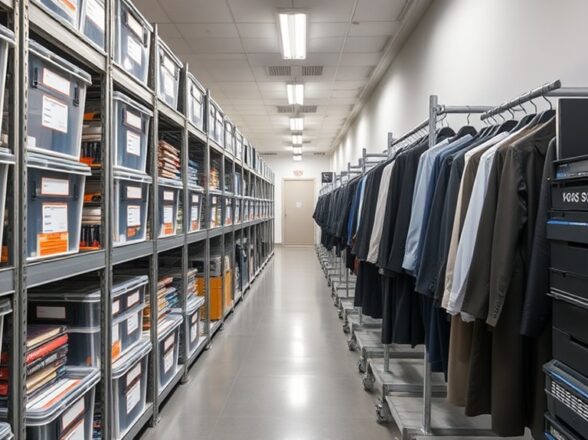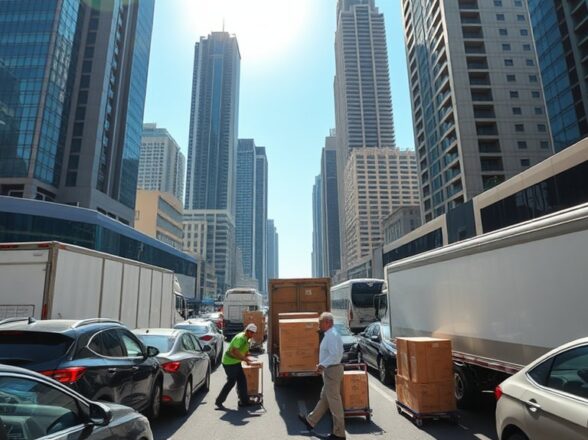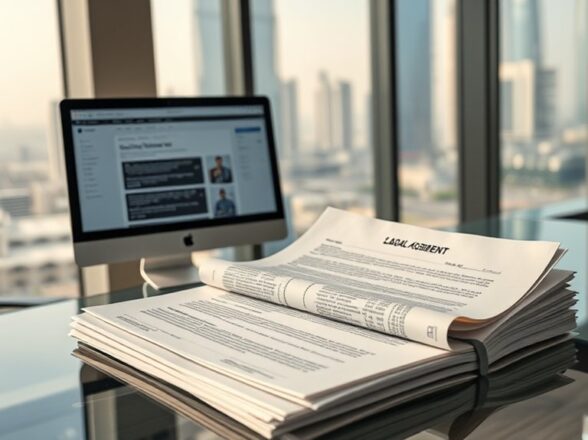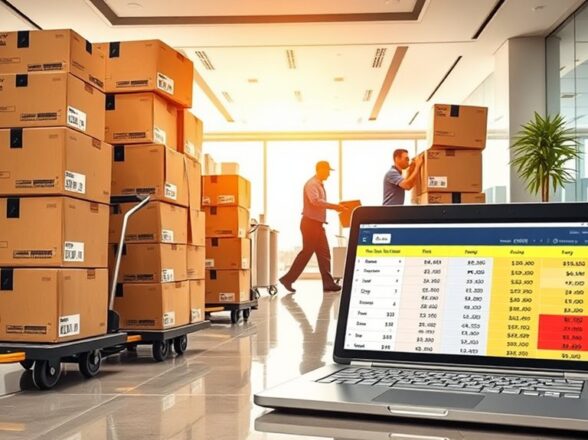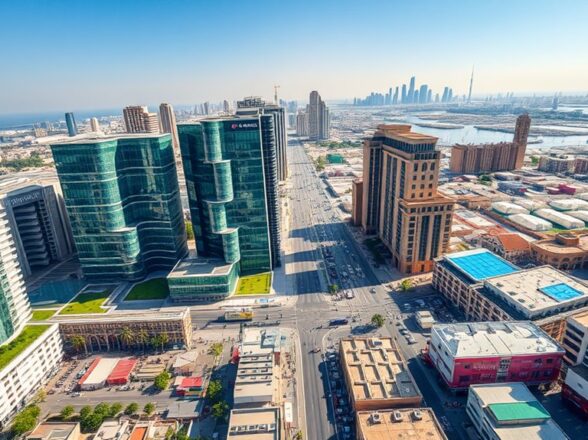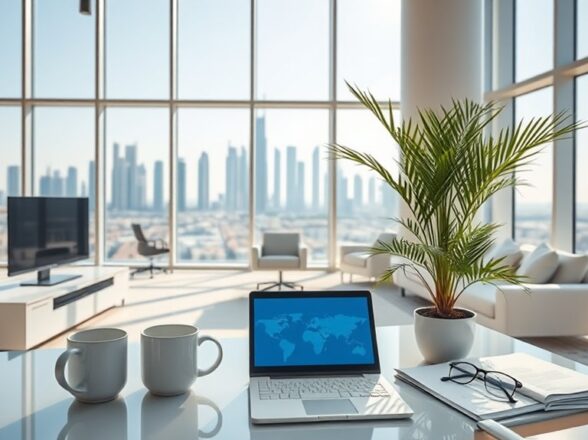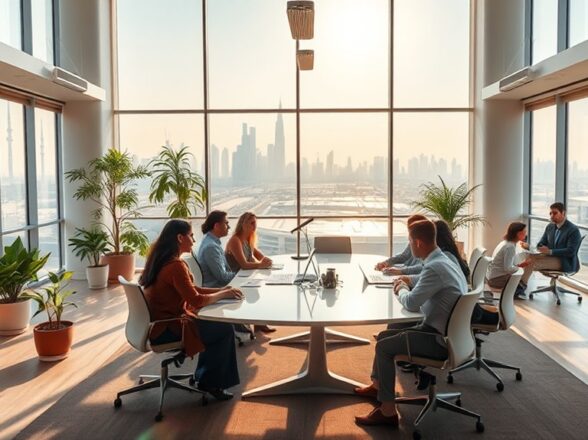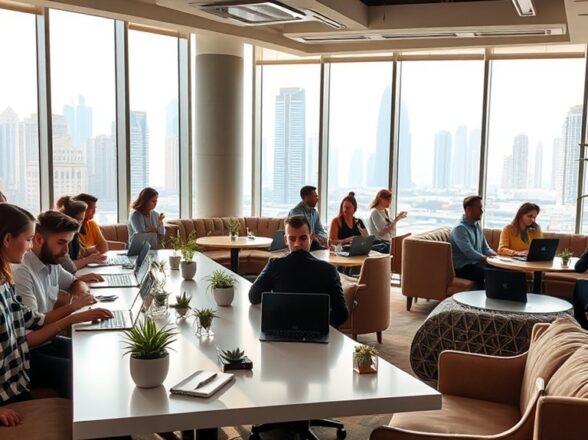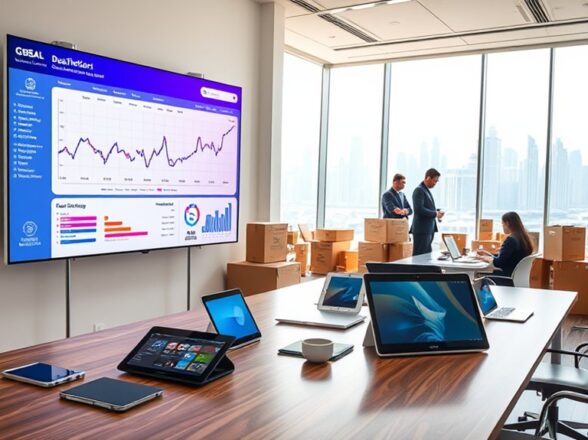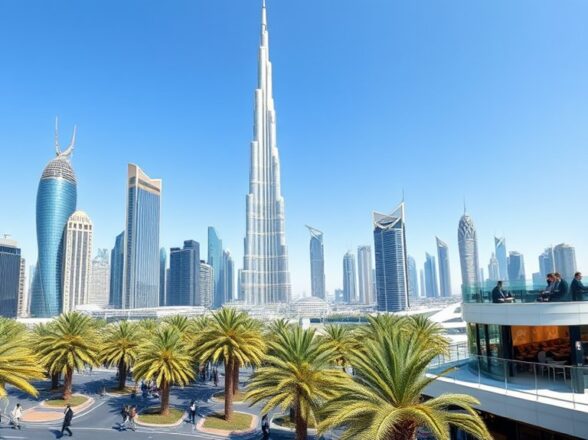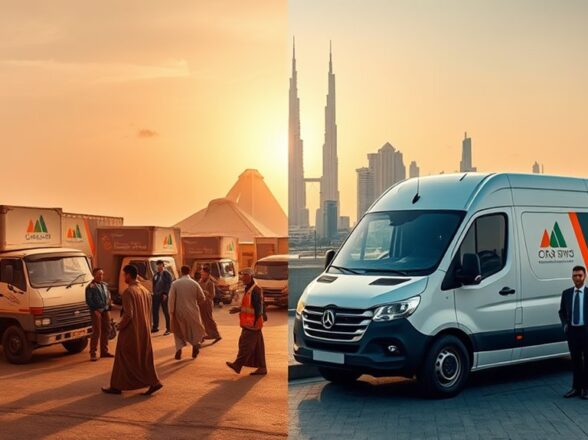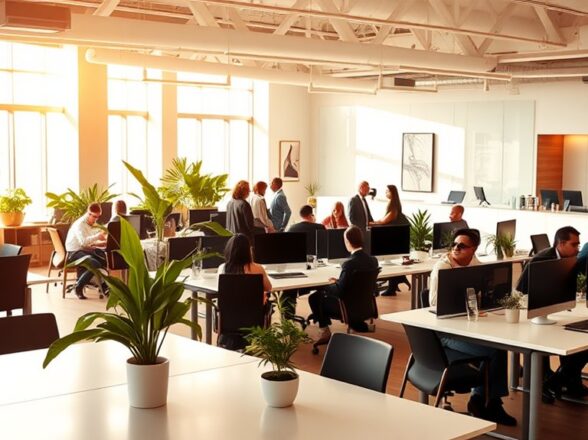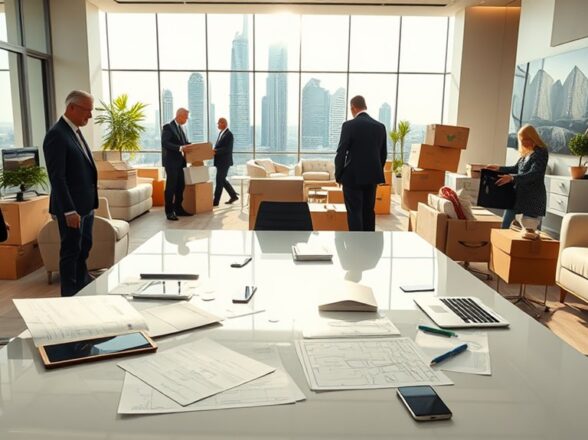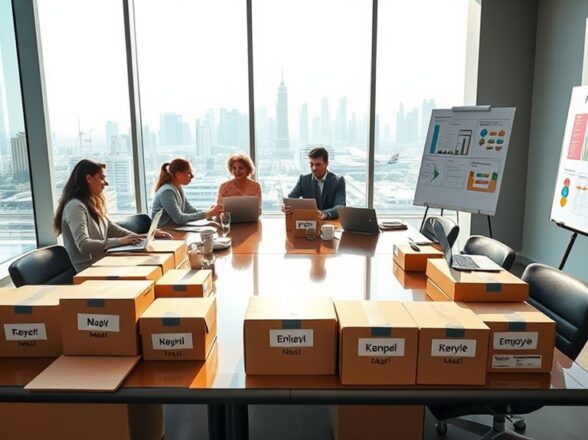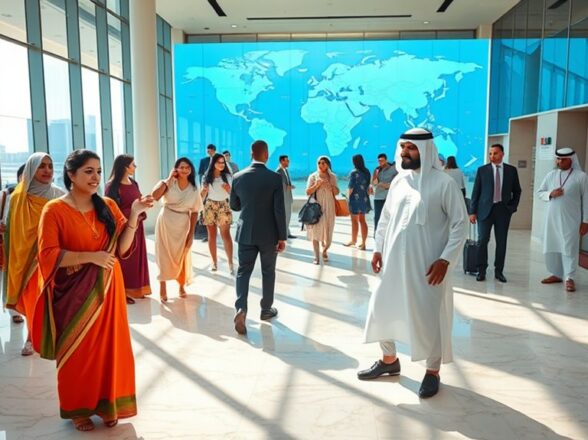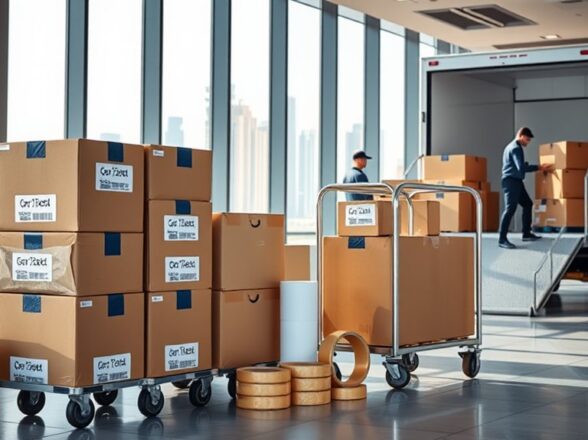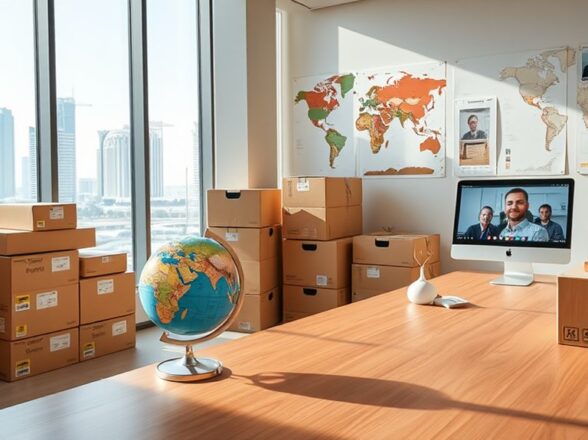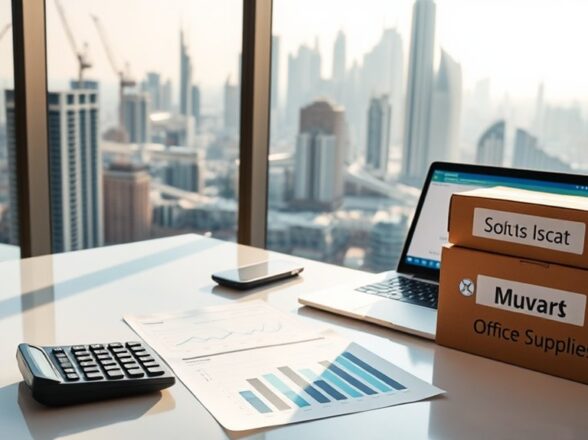How Dubai’s Real Estate Market Drives Office Relocation Trends
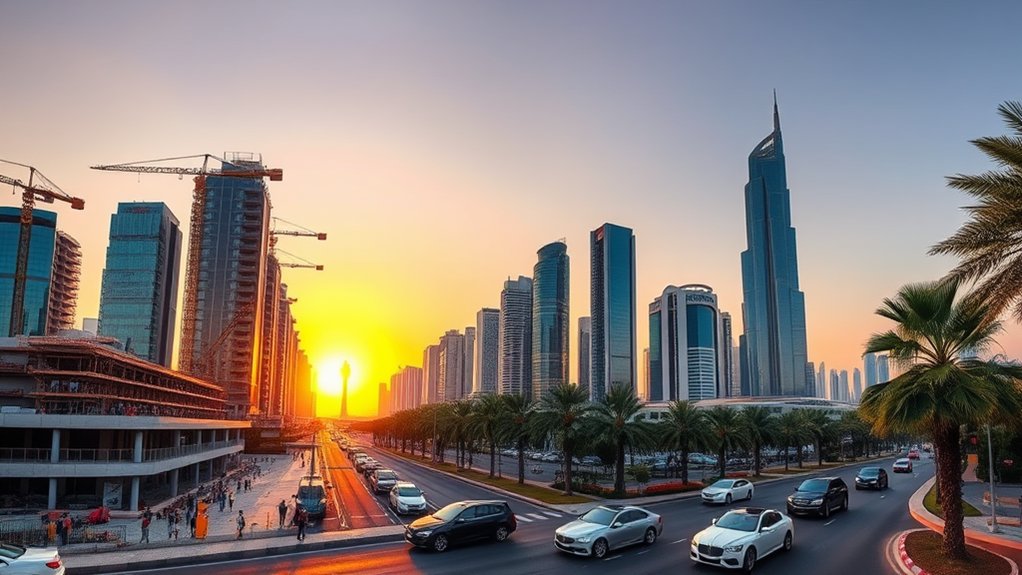
Dubai's real estate market is reshaping your office relocation decisions. Increased demand for Grade A office spaces reflects rising rental values, which are up 25% year-on-year. High occupancy rates in prime areas push businesses to explore flexible workspace solutions, especially with the hybrid work trend. Economic drivers, like the D33 agenda and attractive government policies, create a favorable environment for companies seeking stability. As you evaluate your options, keep in mind that new developments and sustainability initiatives are also influencing this landscape. If you're curious about more trends and insights, you might find what comes next intriguing.
Key Takeaways
- Rising Grade A rental values, up 25% year-on-year, compel businesses to reassess and optimize their office space needs.
- High occupancy rates in key districts drive demand, prompting companies to consider relocation for better space options.
- The D33 economic agenda and infrastructure improvements enhance Dubai's attractiveness, influencing businesses to relocate to capitalize on growth.
- Increased interest in flexible workspace solutions, spurred by hybrid working models, encourages businesses to seek adaptable office arrangements.
- Anticipated new developments will address office space shortages, providing more options for companies considering relocation to prime areas.
Current State of the Market
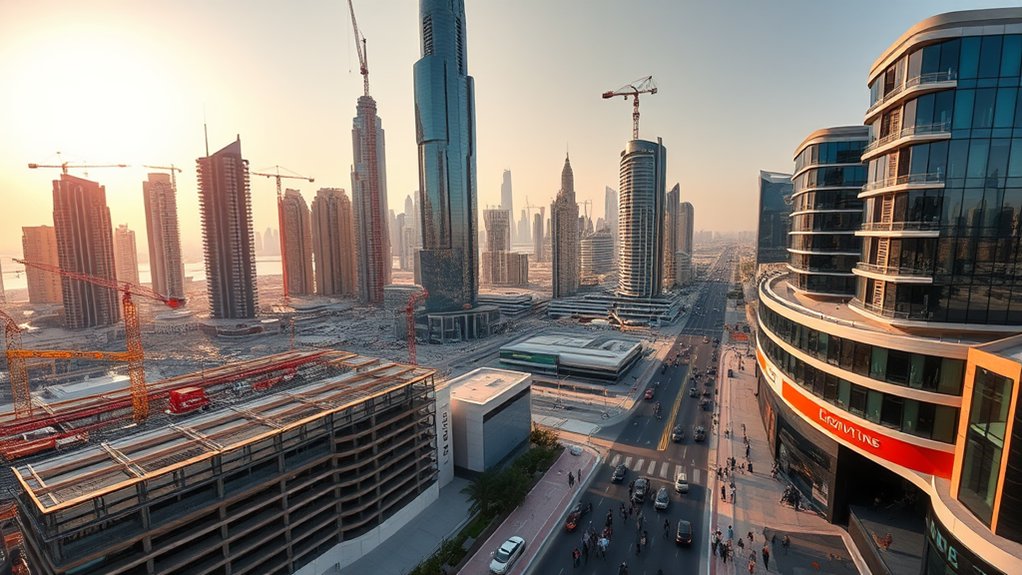
As Dubai's commercial office market thrives, you're likely noticing the unprecedented demand that has emerged in recent months. The current state of the market reflects a significant shift, with occupancy rates in prime areas soaring between 95% and 97%. This surge is a reflection of the evolving real estate trends in the Dubai Office Market, where businesses are keen to secure high-quality office spaces.
In H1 2024 alone, over 24,000 new business registrations indicate a robust demand for office spaces that align with the Dubai Economic Agenda (D33). The market's response is evident in the substantial rise in average Grade A rental values, which have jumped by 25% year-on-year. Areas like Business Bay and Downtown are even seeing rental increases of 44% and 36%, respectively, highlighting the competitive landscape for businesses seeking prime locations.
Moreover, the shift towards hybrid working models has fueled the need for flexible office spaces, as companies adapt to new operational strategies. Providers are stepping up, offering attractive options that cater to the diverse needs of startups and established international firms alike. Additionally, many companies are considering professional moving services to ensure a smooth transition to their new office locations. This trend is further supported by the importance of creating a moving budget that accounts for all potential expenses involved in the relocation process. To this end, businesses are increasingly seeking expert guidance in their office relocation efforts, emphasizing the significance of thorough office relocation planning tips. By implementing these tips, they can mitigate potential disruptions and enhance productivity during the transition. Furthermore, staying informed about the latest trends in workplace design can lead to a more engaging and efficient environment that meets the evolving needs of their teams.
Looking ahead, upcoming developments like DIFC Square and Immersive Tower are poised to introduce an additional 10 million sq. ft. of Grade A office space by 2028, promising new opportunities for businesses considering relocation. The current state of the market clearly demonstrates a booming demand, positioning Dubai as a leading destination for businesses worldwide.
Key Factors Influencing Office Demand
As you navigate Dubai's evolving office landscape, you'll notice rising rental rates prompting many businesses to rethink their space needs. The shift towards flexible workspace solutions reflects the growing demand for adaptability in the workplace. Additionally, economic growth drivers are influencing your relocation decisions and expansion strategies. Many businesses are considering commercial moving services to ensure a seamless transition during this period of change. Furthermore, taking advantage of Dubai's tax-free environment can significantly enhance your company's financial efficiency during the relocation process.
Rising Rental Rates
Rising rental rates in Dubai's office market are reshaping the landscape for businesses seeking prime locations. With average Grade A rental values soaring by 25% year-on-year, areas like Business Bay and Downtown have seen increases of 44% and 36%, respectively. This surge reflects the growing demand for luxury office spaces, pushing occupancy rates in key districts such as DIFC, Downtown, and Business Bay to an impressive 95% to 97%.
As operational costs and inflation continue to rise, many occupiers are reassessing their expansion strategies. Instead of pursuing new acquisitions, you're likely prioritizing lease renewals to maintain stability in a competitive market. While the anticipated delivery of 10 million sq. ft. of new office developments, including DIFC Square and Immersive Tower, aims to ease current shortages, the timing aligns with market recovery forecasts. Additionally, understanding moving costs in Dubai can help businesses plan their relocations more effectively. The average cost of moving a house in Dubai can range from AED 2,000 to AED 10,000, which adds to the considerations for potential office relocations.
Strategic planning for these office developments is essential to guarantee they meet the evolving needs of businesses. By 2026, a balance between supply and demand should emerge, but maneuvering the current landscape requires careful consideration of rising rental rates and the implications for your office relocation decisions.
Flexible Workspace Solutions
The surge in rental rates is prompting businesses in Dubai to explore innovative office solutions, particularly flexible workspaces. The rise of hybrid working models is driving this demand, as companies favor open-plan layouts and co-working spaces to enhance collaboration and efficiency.
Providers like Executive Centre and Cloud Spaces are stepping in to meet these needs, offering flexible lease terms and quick operational setups, which are especially appealing to startups and international firms. With occupancy rates in prime areas hovering between 95% and 97%, it's clear that there's a strong preference for high-quality, adaptable office spaces.
Here's a quick overview of the current market trends:
| Key Factors | Details | Implications |
|---|---|---|
| Flexible Workspace Solutions | Increasingly popular among businesses | Supports hybrid working models |
| Occupancy Rates | 95% to 97% in prime areas | Indicates strong demand for spaces |
| Grade A Rental Values | Increased by 25% year-on-year | Reflects competitive landscape |
The anticipated influx of new developments aims to address this growing demand while alleviating rental pressures in the market.
Economic Growth Drivers
While Dubai's strategic initiatives, like the D33 economic agenda, boost office space demand, the influx of new business registrations signals a thriving market. You'll notice that the city's economic growth drivers are reshaping the landscape, with over 24,000 new registrations in the first half of 2024 alone, marking a 5% increase year-on-year. This growth not only elevates the demand for office spaces but also enhances the appeal of prime business districts like DIFC, Downtown, and Business Bay, where occupancy rates soar between 95% and 97%.
Moreover, significant infrastructure development, such as the upcoming Dubai Metro Blue Line and the relocation of Dubai International Airport, is poised to further increase demand for office spaces along these crucial transport routes. As businesses expand to accommodate a projected population growth of over 160,000 newcomers by 2025, the need for high-quality, accessible office environments becomes even more essential. With average Grade A rental values surging by 25% year-on-year, businesses are recognizing the importance of premium office spaces to thrive in this dynamic market.
Rental Trends and Implications
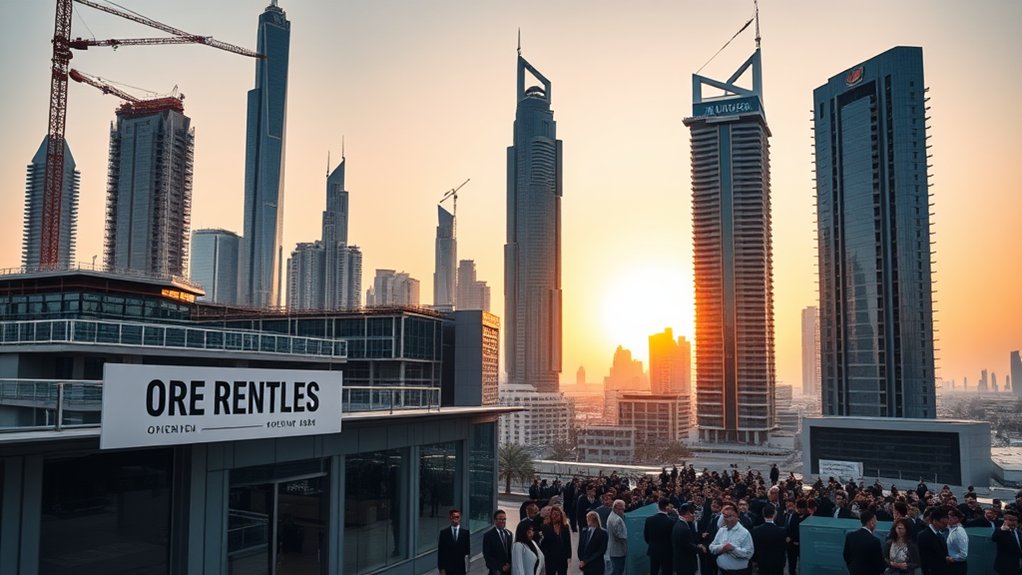
As you explore Dubai's rental trends, you'll notice a significant rise in costs, particularly for Grade A office spaces. With demand surging, areas like Business Bay and Downtown have seen rental values jump dramatically. This shift not only impacts your budgeting but also forces you to rethink your leasing strategies in a competitive market.
Rising Rental Costs
Rising rental costs in Dubai are reshaping the landscape for businesses as they navigate an increasingly competitive market. With average Grade A rental values surging by 25% year-on-year, companies are feeling the pinch, especially in prime areas like Business Bay and Downtown, where jumps of 44% and 36% have been recorded. High occupancy rates, ranging from 95% to 97% in these sought-after districts, reflect the intense demand for office space, driving rental values even higher.
As a result of these rising rental costs, many occupiers are reassessing their expansion strategies. Instead of pursuing new acquisitions, they're opting for lease renewals to manage escalating expenses. Economic pressures, including inflation and geopolitical factors, further exacerbate operational costs, compelling businesses to rethink their leasing decisions.
New developments, like DIFC Square and Immersive Tower, aim to alleviate some of these challenges by adding 10 million sq. ft. of office space by 2028. However, the current market dynamics suggest that the trend of rising rental costs will continue to influence how businesses approach their real estate needs in Dubai.
Grade A Demand
Despite the challenges posed by escalating rental costs, demand for Grade A office spaces in Dubai remains robust. The average rental values for these high-quality offices have soared by 25% year-on-year, with prime areas like Business Bay and Downtown experiencing staggering increases of 44% and 36%, respectively. This competitive market reflects a strong appetite for Grade A properties amidst high occupancy rates, which range from 95% to 97%.
As businesses adapt to the evolving landscape, the implications are clear. Here are three key trends to reflect on:
- Lease Renewals Over New Leases: Companies are increasingly opting for lease renewals in Grade A properties, valuing stability despite rising costs.
- Anticipated New Developments: The upcoming 10 million sq. ft. of Grade A office space set to launch by 2028 aims to address current shortages and enhance options for occupiers.
- Strategic Relocation Planning: Businesses are reassessing their real estate strategies, focusing on the importance of high-quality office spaces in their long-term plans.
This ongoing demand for Grade A offices indicates a strong future for Dubai's commercial real estate market.
Role of Flexible Workspaces
Flexible workspaces are rapidly becoming essential in Dubai's evolving real estate landscape, catering to the needs of businesses embracing hybrid models. As you navigate this dynamic market, you'll notice that startups and established companies alike are favoring open-plan layouts and co-working spaces. These options allow for adaptability, enabling you to respond to changing business needs without the constraints of traditional office environments.
Providers like Executive Centre and Cloud Spaces are stepping up to meet this demand, offering attractive flexible workspace solutions with short lease terms and quick operational setups. This is particularly appealing as many occupiers are prioritizing cost management, leading to a trend of lease renewals rather than new acquisitions. By opting for flexible workspaces, you can markedly reduce overhead costs while maintaining access to high-quality office environments.
Moreover, as international firms increasingly express interest in these flexible office spaces, the market is evolving to accommodate diverse working arrangements. This flexibility enhances your operational efficiency, allowing you to pivot quickly in response to market changes. The anticipated influx of new office developments aligns perfectly with this trend, as these spaces aim to provide high-quality options tailored to your evolving business demands.
Economic Drivers Behind Relocation
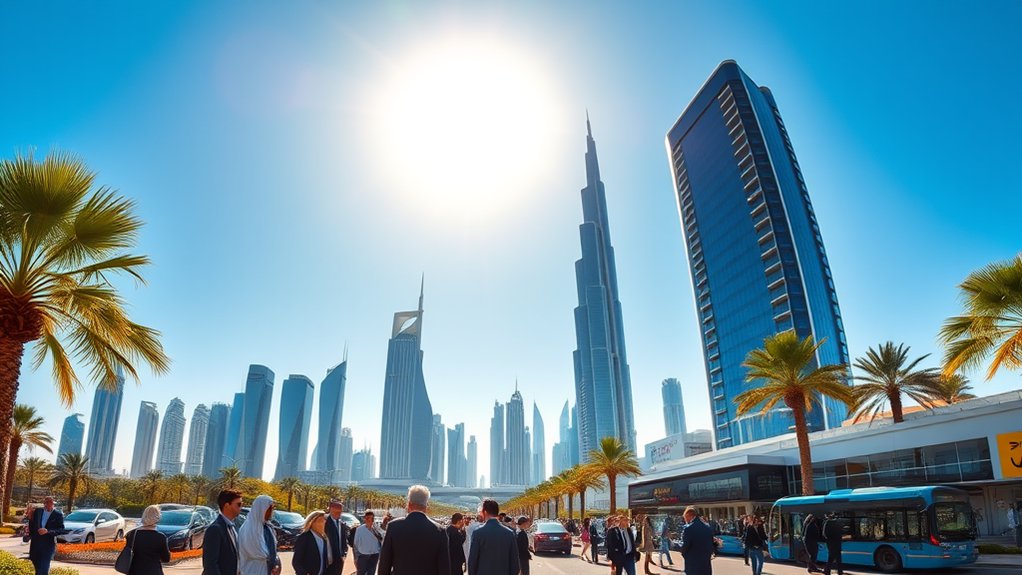
As the Dubai Economic Agenda (D33) strengthens the emirate's position as a premier hub for international trade, many businesses are relocating to capitalize on improved access to markets and resources. Several economic drivers are influencing these decisions, making it essential for you to stay informed about the current landscape.
- Rising Rental Rates: With average Grade A rental values soaring by 25% year-on-year, companies are forced to reevaluate their office space needs. This creates an opportunity to find more cost-effective locations that still meet operational requirements.
- Population Growth: The projected influx of over 160,000 newcomers by 2025 considerably boosts demand for office spaces. To attract top talent and serve a growing client base, businesses must adapt their locations accordingly.
- Infrastructure Improvements: Upcoming projects, like the Dubai Metro's Blue Line, enhance property appeal and accessibility. Businesses are increasingly drawn to areas with better transport links, making these locations more desirable for relocation.
These economic drivers collectively shape the real estate landscape in Dubai, prompting businesses to rethink their strategies. By understanding these factors, you can make informed decisions about your office relocation, ensuring you're positioned to thrive in this dynamic environment. As Dubai continues to evolve, adapting to these changes will be crucial for long-term success.
Emerging Business Districts
With the economic landscape shifting, businesses are increasingly looking at emerging business districts in Dubai to optimize their operations. Areas like Expo City and Dubai Science Park have witnessed a remarkable 37% increase in demand, thanks to their quality facilities and strong transport links. As you think about relocating, these districts offer modern office spaces that cater to a variety of business needs.
The anticipated relocation of Dubai International Airport to Dubai South is set to further fuel demand for office spaces in the area, making it a competitive choice for businesses. Furthermore, the rise in interest from international firms in flexible workspace solutions highlights a growing trend toward co-working environments, which are becoming increasingly popular in these emerging locations.
Here's a snapshot of how different emerging business districts compare regarding available office options and amenities:
| Business District | Demand Increase | Notable Features |
|---|---|---|
| Expo City | 37% | Quality facilities, transport links |
| Dubai Science Park | 37% | Innovative environment, R&D focus |
| Dubai South | Anticipated | Proximity to new airport, flexibility |
| DIFC Square | Projected | High-end office space, financial hub |
| Immersive Tower | Projected | Advanced technology, creative spaces |
With new developments like DIFC Square and Immersive Tower expected to add 10 million square feet of Grade A office space by 2028, businesses have a wealth of options to evaluate while making relocation decisions.
Impact of Government Policies

Government policies play an essential role in shaping Dubai's real estate landscape, particularly in office relocations. By creating a business-friendly environment, these policies attract foreign investment and stimulate demand for office spaces. As you consider relocating your business, you'll find that the strategic initiatives implemented by the government markedly influence your decisions.
Here are three key impacts of government policies on office relocations:
- Long-term Residency Visas: The introduction of long-term residency visas has bolstered investor confidence, making it easier for international firms to establish a presence in Dubai. This stability encourages companies to commit to relocating their offices.
- Infrastructure Developments: Projects like the upcoming Dubai Metro's Blue Line are set to enhance accessibility to office spaces. Improved transportation links make it more convenient for companies to relocate, drawing businesses to new areas.
- Focus on Innovation: The government's commitment to innovation and technology integration in commercial sectors is setting new standards for office environments. Companies are increasingly seeking modern, tech-enabled spaces that align with these advancements, prompting relocations to more suitable locations.
Sustainability in Office Spaces
While many businesses are prioritizing sustainability, Dubai's office spaces are evolving to meet this demand. By 2025, approximately 35% of new office spaces in the city are projected to be LEED-certified, up from 25% in 2023. This shift highlights a growing commitment to eco-friendly practices in commercial real estate. Developers are increasingly adopting green building standards, with sustainable properties expected to account for 35% of total transactions by 2025.
One key aspect of this evolution is the integration of smart technologies. Innovations like IoT and AI enhance security and efficiency, making these sustainable office developments attractive to eco-conscious businesses. You'll find that many new buildings incorporate energy-efficient designs, including solar panels, aligning with Dubai's vision for sustainable urban growth.
Moreover, the rising demand for flexible workspace solutions, driven by hybrid working models, has led to the creation of open-plan layouts and co-working spaces. These designs not only prioritize resource efficiency but also foster collaboration and innovation among teams.
As you explore Dubai's real estate market, it's clear that sustainability is no longer just a buzzword; it's a fundamental aspect of office space development. Embracing these trends can greatly enhance your business's reputation while contributing to a greener future. Whether you're relocating or considering a new space, prioritizing sustainability can set you apart in today's competitive landscape.
Future Market Projections
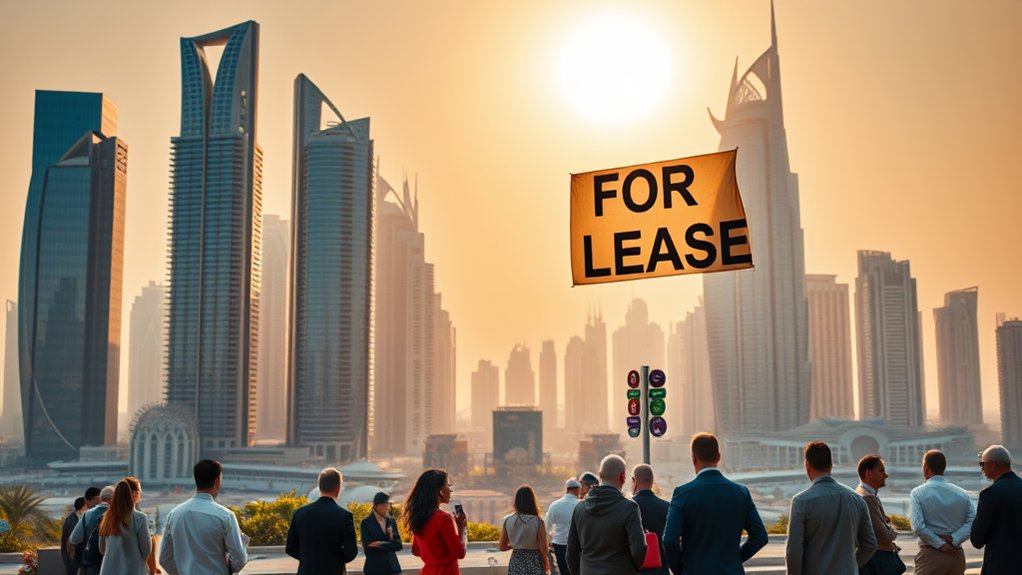
As you look ahead, you’ll notice a significant increase in office supply in Dubai, with new Grade A spaces coming online by 2028. This surge is set against a backdrop of economic recovery, which bodes well for businesses considering relocation. With strong demand and evolving needs, the office market is primed for a vibrant transformation. Moreover, the upcoming influx of high-quality office spaces is expected to attract both local and international companies, further enhancing the competitive landscape. This trend is largely influenced by the expo 2020 impact on office relocation, which has set the stage for businesses to reconsider their corporate strategies. As companies anticipate the benefits of modern facilities, they are likely to seek out innovative workspaces that foster collaboration and productivity. These changes are not only reshaping the physical landscape, but are also driving evolving office moving trends in Dubai. Companies are prioritizing flexible layouts and state-of-the-art amenities to support a hybrid workforce, reflecting a broader shift in workplace expectations. As a result, businesses will need to adapt quickly to stay competitive, making strategic decisions that align with these emerging trends in order to attract and retain top talent.
Anticipated Supply Increase
Given the current demand for office space in Dubai, an influx of around 10 million sq. ft. of new Grade A office space is set to transform the market by 2028. This anticipated supply increase is essential to address the persistent office space shortages in Dubai's commercial market, where occupancy rates have soared between 95% and 97%.
Here's what you can expect from this upcoming supply:
- Market Balance: The new office developments, including projects like DIFC Square and Immersive Tower, are expected to achieve a balance between supply and demand by 2026, fostering stability in the market.
- Competitive Pricing: With the completion of these developments, increased competition is likely to moderate rental rates, which have surged by 25% year-on-year.
- Flexible Leasing: As businesses adapt to evolving needs, the enhanced market options will allow greater flexibility in negotiating lease terms, benefiting occupiers considerably.
The anticipated supply increase not only aims to alleviate current shortages but also positions Dubai's commercial market for sustainable growth in the coming years.
Economic Recovery Outlook
With the expected influx of Grade A office spaces, Dubai's commercial real estate market is set for a significant recovery. As you consider your options, you'll notice that the average Grade A rental values have surged by 25% year-on-year. This strong demand might lead you to reassess your current office location, especially if you're seeking more cost-effective solutions.
The upcoming delivery of about 10 million sq. ft. of new office developments, including DIFC Square and Immersive Tower, by 2028 will provide numerous choices for businesses contemplating relocation. The Dubai Economic Agenda (D33) further reinforces the emirate's status as a global business hub, encouraging you to explore spaces that align with your growth ambitions.
Moreover, flexible workspace solutions are gaining traction, as many businesses adapt to hybrid working models. You may find yourself increasingly leaning towards co-working spaces or short-term leases that allow for operational efficiency without long-term commitments. As the market stabilizes and balances supply and demand by 2026, this economic recovery outlook shines a positive light on your potential office relocation decisions.
Case Studies of Relocations
While many companies grapple with the challenges of rising operational costs and limited office space, several have successfully navigated the shifting landscape of Dubai's commercial real estate market. Significantly, three case studies illustrate how businesses adapted to this dynamic environment:
- Tech Startups: A group of tech startups relocated from less desirable areas to co-working spaces in Business Bay, capitalizing on the rising demand for flexible workspace. This move allowed them to reduce overhead costs while benefiting from networking opportunities with other innovative firms.
- Financial Firms: A mid-sized financial firm decided to move from an outdated office in DIFC to a newly developed Grade A space. The company was attracted by the 25% year-on-year surge in rental values, believing that a modern office would enhance employee satisfaction and attract top talent.
- Multinational Corporations: A multinational corporation reassessed its presence in Downtown due to soaring occupancy rates. They opted for a short-term lease in a luxury co-working space, enabling them to maintain flexibility while waiting for upcoming developments like DIFC Square, which promises additional high-quality office options.
These examples underscore how understanding the current demand for real estate and relocation trends can lead to strategic decisions. As businesses continue to seek modern, flexible workspaces, it's clear that adapting to Dubai's evolving office landscape is key to thriving in this competitive market.
Frequently Asked Questions
What Types of Companies Are Relocating to Dubai's Office Spaces?
If you're looking at companies relocating to Dubai's office spaces, you'll find a mix of tech startups, financial services, creative agencies, logistics firms, and healthcare companies. These businesses are drawn by the city's strategic location, favorable tax environment, and vibrant economy. Tech startups thrive in the innovative atmosphere, while financial services benefit from the robust infrastructure. Creative agencies tap into the diverse market, and logistics firms leverage Dubai's connectivity, making it an attractive hub for growth.
How Does Dubai's Culture Influence Office Design Preferences?
Dubai's rich culture heavily influences your office design preferences. You'll find that Arabian aesthetics often blend with modern elements, creating inviting spaces. Open spaces promote collaboration, fostering a sense of community among your team. Additionally, technology integration is key, enhancing productivity and connectivity. You might also notice cultural symbolism in artwork and architecture, reflecting the city's heritage while inspiring creativity. Embracing these aspects makes your workspace not just functional, but culturally resonant.
What Are the Average Lease Durations for Office Spaces in Dubai?
In Dubai, average lease durations for office spaces typically range from one to three years. As you navigate lease negotiation strategies, it's essential to stay informed about commercial lease trends. Flexibility in office space can benefit you, especially during lease renewal processes. Additionally, being aware of tenant rights guarantees you make informed decisions throughout your lease term, helping you adapt to any changes in the market or your business needs.
Are There Financial Incentives for Businesses Relocating to Dubai?
Did you know that businesses in Dubai can save up to 100% on corporate taxes for several years? If you're considering relocating, you'll find numerous financial incentives, including tax incentives and free zones that simplify business setup. These benefits help reduce operational costs and foster economic growth. By moving to Dubai, you not only cut expenses but also position your business in a thriving market, ready for future opportunities.
How Does Remote Work Impact Office Relocation Decisions in Dubai?
Remote work's reshaping office relocation decisions in Dubai. You'll notice that companies prioritize office space that accommodates flexibility demands, allowing employees to blend work and personal life effectively. This shift means you might see more businesses seeking locations that support a better work-life balance. Employee preferences are increasingly influencing these choices, as organizations adapt to a workforce that values both remote options and collaborative environments, leading to a dynamic office landscape.
Conclusion
As Dubai's real estate market thrives, it simultaneously reshapes office relocation trends. While some companies are drawn to luxurious high-rises, others seek the agility of flexible workspaces. You'll find traditional firms embracing sustainability, poised against startups enthusiastic for innovation. This dynamic interplay between luxury and practicality reflects a vibrant market that's constantly evolving. As you watch these trends unfold, consider how they might redefine your own workspace needs in this ever-changing landscape.
Related posts
Recent posts
Post Categories
Tags
Subscribe


